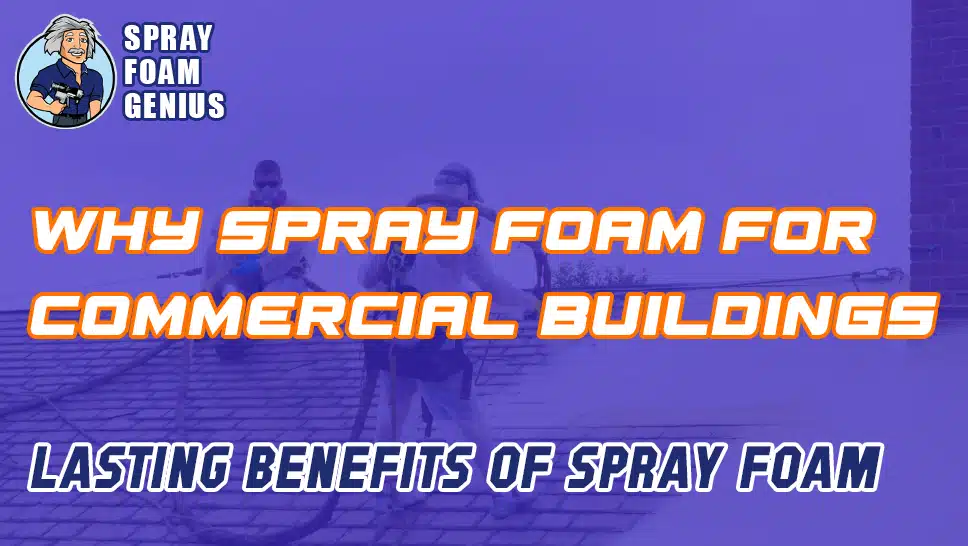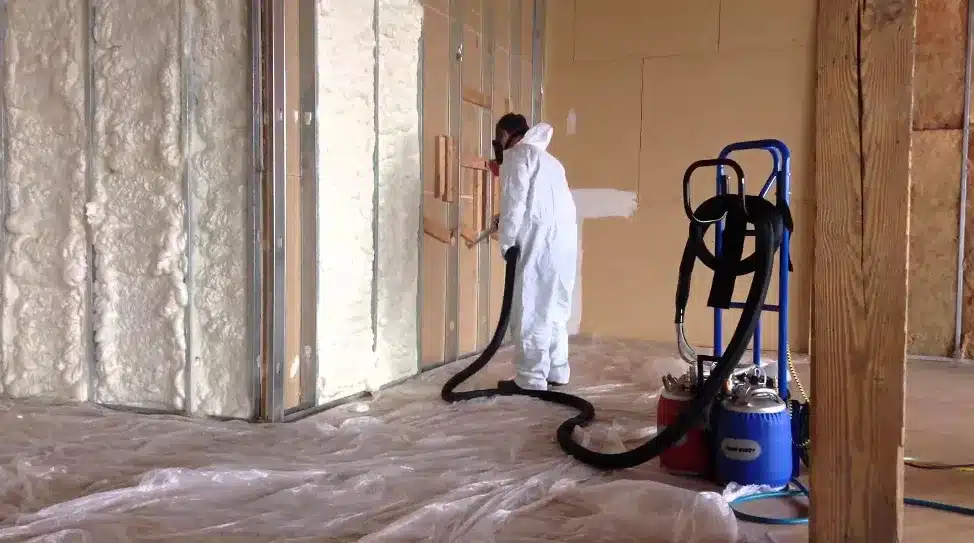
In the commercial real estate and building management sectors, making cost-effective and efficient decisions is crucial. Among various insulation options, spray foam insulation stands out as a high-performance solution that offers significant long-term financial benefits. This in-depth analysis will explore how spray foam insulation not only enhances energy efficiency and comfort but also provides substantial financial advantages for commercial buildings. Our aim is to provide valuable insights specifically tailored for spray foam contractors in the USA and Canada, demonstrating how understanding these benefits can enhance their service offerings and business potential.
What is Spray Foam Insulation?
Spray foam insulation is a popular choice in the commercial construction industry due to its superior performance characteristics. It consists of two main components—a resin and a hardener—that are mixed together and then sprayed onto surfaces. Once applied, the foam expands rapidly, filling gaps, cracks, and cavities to create an airtight seal. This results in a continuous barrier that significantly improves the building’s thermal performance and energy efficiency.
Types of Spray Foam Insulation
- Open-Cell Spray Foam: This type of spray foam is lighter and less dense, offering good thermal insulation and soundproofing. It is typically used in interior applications where a lower R-value is sufficient.
- Closed-Cell Spray Foam: Denser and more rigid, closed-cell spray foam provides a higher R-value and acts as a moisture barrier. It is ideal for exterior applications and areas prone to high humidity or potential water exposure.
Financial Benefits of Spray Foam Insulation
1. Energy Efficiency and Savings
Spray foam insulation is renowned for its ability to enhance energy efficiency in commercial buildings. By providing an mexcellent thermal barrier, it reduces heat transfer between the interior and exterior environments. This results in significant energy savings, which can have a substantial impact on a building’s operating costs.
- Reduced Energy Consumption: Spray foam insulation’s high R-value means it offers superior resistance to heat flow compared to traditional insulation materials. This results in lower heating and cooling requirements, leading to a reduction in energy consumption and utility bills.
- Lower HVAC Costs: With improved insulation, HVAC systems can operate more efficiently, requiring less energy to maintain comfortable indoor temperatures. This not only reduces energy bills but also extends the lifespan of HVAC equipment, reducing the frequency and cost of repairs or replacements.
2. Increased Property Value
Investing in spray foam insulation can enhance the overall value of a commercial property. Energy-efficient buildings are highly desirable in the real estate market, and spray foam insulation is a key feature that can attract potential buyers or tenants.
- Market Appeal: Properties with advanced insulation systems like spray foam often stand out in competitive markets. They are seen as modern, energy-efficient, and cost-effective, making them more appealing to prospective tenants and buyers.
- Higher Resale Value: The installation of spray foam insulation can lead to an increase in the property’s resale value. As more buyers and tenants prioritize energy efficiency, buildings with spray foam insulation can command higher prices and attract more interest.
3. Reduced Maintenance and Repair Costs
Spray foam insulation contributes to the overall durability and longevity of a building. By minimizing issues such as air leaks and moisture infiltration, it reduces the need for frequent maintenance and repairs.
- Moisture Management: Spray foam insulation helps control moisture levels within walls and other hidden areas. By preventing moisture from entering these spaces, it reduces the risk of mold, mildew, and rot, which can lead to costly repairs and health issues.
- Longevity: Unlike traditional insulation materials that can settle, degrade, or lose effectiveness over time, spray foam insulation maintains its performance and integrity. This durability means less frequent need for replacements and lower long-term maintenance costs.
4. Enhanced Indoor Air Quality
One of the lesser-known benefits of spray foam insulation is its positive impact on indoor air quality. By sealing gaps and cracks, spray foam insulation prevents the infiltration of outdoor pollutants, contributing to a healthier indoor environment.
- Improved Air Quality: The airtight seal created by spray foam insulation helps keep dust, pollen, and other allergens from entering the building. This leads to cleaner, fresher air inside, which can be particularly beneficial for people with allergies or respiratory conditions.
- Increased Comfort: By maintaining stable indoor temperatures and reducing drafts, spray foam insulation enhances overall comfort. A more comfortable environment can lead to increased productivity and satisfaction among building occupants.

Case Studies and Real-World Examples
Case Study 1: Office Building in New York City
An office building in New York City underwent a significant retrofit that included the installation of spray foam insulation. The project resulted in a 30% reduction in annual energy costs, equating to approximately $40,000 in savings per year. Additionally, the building’s market value increased by 15%, reflecting the high demand for energy-efficient properties in the area.
Case Study 2: Retail Space in Toronto
A retail space in Toronto experienced substantial financial benefits from spray foam insulation. The installation led to a 25% reduction in heating and cooling expenses, resulting in annual savings of $15,000. The improved indoor air quality also contributed to a more pleasant shopping environment, positively affecting customer satisfaction and boosting sales.
Financial Considerations for Spray Foam Contractors
For spray foam insulation contractors, understanding the financial benefits of spray foam insulation is essential for offering value to clients and growing their business. Here are key financial considerations:
1. Cost of Installation vs. Long-Term Savings
While spray foam insulation may have a higher initial cost compared to traditional insulation materials, the long-term savings often outweigh the initial investment. Contractors should clearly communicate these long-term financial benefits to clients, emphasizing how the energy savings and reduced maintenance costs can result in a favorable return on investment (ROI).
2. Return on Investment (ROI)
Clients are often interested in understanding the ROI of their investment in spray foam insulation. Providing detailed calculations and real-world examples can help illustrate how the initial costs are offset by the savings achieved over time. This can include energy cost reductions, lower maintenance expenses, and increased property value.
3. Competitive Advantage
Specializing in spray foam insulation can provide a competitive edge in the market. As commercial property owners increasingly recognize the financial benefits of energy-efficient insulation, contractors who offer spray foam solutions will be well-positioned to attract and retain clients. Highlighting the advantages of spray foam insulation can set your services apart from competitors.
Practical Tips for Maximizing Benefits
1. Ensure Proper Installation
The effectiveness of spray foam insulation relies on proper installation. It’s crucial to follow manufacturer guidelines and use the appropriate type of spray foam for each application. Ensuring correct application helps maximize the benefits and avoids potential issues.
2. Conduct Regular Maintenance
Regular inspections and maintenance of spray foam insulation can help maintain its performance. Addressing any issues promptly ensures that the insulation continues to provide its benefits and prevents potential problems that could lead to additional costs.
3. Educate Clients
Educate clients about the long-term benefits of spray foam insulation, including potential savings and improved property value. Providing detailed information and real-world examples can help clients appreciate the value of their investment and make informed decisions.
Contact Us for Expert Guidance
If you’re a spray foam contractor looking to enhance your business and provide valuable insights to your clients, Spray Foam Genius Marketing is here to help. We offer specialized services in SEO, Google My Business optimization, local SEO, website development, lead generation, social media marketing, and reputation management tailored specifically for spray foam insulation contractors.
For more information and to explore how we can support your business, Call us at 877-840-FOAM for USA and 844-741-FOAM for Canada visit our website at sprayfoamgeniusmarketing.com, or email us at [email protected] to get started., or email us at [email protected]. Let us help you maximize your business potential and deliver exceptional value to your clients.
- 5 Google My Business Hacks to Double Your Leads for Spray Foam Insulation Contractors - January 14, 2025
- Why Spray Foam Contractors Cannot Ignore Reputation Management in 2025 - January 13, 2025
- Local SEO Secrets Every Spray Foam Contractor Must Know to Win in 2025 - January 13, 2025

